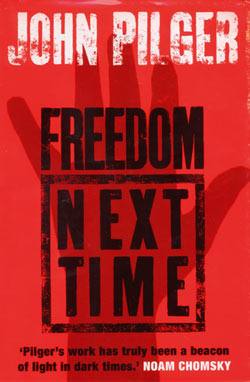
 Innovative Minds © 2014. All Rights Reserved. www.inminds.co.uk | ||||
|
[Other] The Invisible Government - PilgerJohn Pilger In a speech in Chicago, John Pilger describes how propaganda has become such a potent force in our lives and, in the words of one of its founders, represents 'an invisible government'. 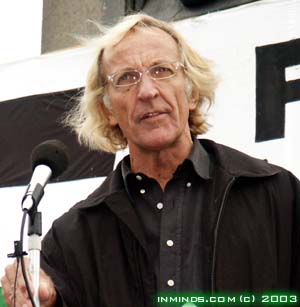 John Pilger addressing an anti-war rally
Edward Bernays, the so-called father of public relations, wrote about an invisible government which is the true ruling power of our country. He was referring to journalism, the media.
The title of this talk is Freedom Next Time, which is the title of my book, and the book is meant as an antidote to the propaganda that is so often disguised as journalism. So I thought I would talk today about journalism, about war by journalism, propaganda, and silence, and how that silence might be broken. Edward Bernays, the so-called father of public relations, wrote about an invisible government which is the true ruling power of our country. He was referring to journalism, the media. That was almost 80 years ago, not long after corporate journalism was invented. It is a history few journalist talk about or know about, and it began with the arrival of corporate advertising. As the new corporations began taking over the press, something called âprofessional journalismâ was invented. To attract big advertisers, the new corporate press had to appear respectable, pillars of the establishmentâobjective, impartial, balanced. The first schools of journalism were set up, and a mythology of liberal neutrality was spun around the professional journalist. The right to freedom of expression was associated with the new media and with the great corporations, and the whole thing was, as Robert McChesney put it so well, âentirely bogusâ.
The power of this invisible government has grown. In 1983 the principle global media was owned by 50 corporations, most of them American. In 2002 this had fallen to just 9 corporations. Today it is probably about 5.
For what the public did not know was that in order to be professional, journalists had to ensure that news and opinion were dominated by official sources, and that has not changed. Go through the New York Times on any day, and check the sources of the main political storiesâdomestic and foreignâyouâll find theyâre dominated by government and other established interests. That is the essence of professional journalism. I am not suggesting that independent journalism was or is excluded, but it is more likely to be an honorable exception. Think of the role Judith Miller played in the New York Times in the run-up to the invasion of Iraq. Yes, her work became a scandal, but only after it played a powerful role in promoting an invasion based on lies. Yet, Millerâs parroting of official sources and vested interests was not all that different from the work of many famous Times reporters, such as the celebrated W.H. Lawrence, who helped cover up the true effects of the atomic bomb dropped on Hiroshima in August, 1945. âNo Radioactivity in Hiroshima Ruin,â was the headline on his report, and it was false.
Take the invasion of Iraq.. the BBC gave just 2 percent of its coverage of Iraq to antiwar dissent. That is less than the antiwar coverage of ABC, NBC, and CBS.
Consider how the power of this invisible government has grown. In 1983 the principle global media was owned by 50 corporations, most of them American. In 2002 this had fallen to just 9 corporations. Today it is probably about 5. Rupert Murdoch has predicted that there will be just three global media giants, and his company will be one of them. This concentration of power is not exclusive of course to the United States. The BBC has announced it is expanding its broadcasts to the United States, because it believes Americans want principled, objective, neutral journalism for which the BBC is famous. They have launched BBC America. You may have seen the advertising. 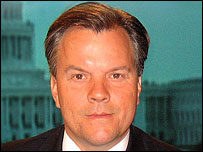 MI-6 planted stories were unnecessary - the BBCâs man in Washington Matt Frei who shortly after the invasion told viewers "There is not doubt that the desire to bring good, to bring American values to the rest of the world, and especially now in the Middle East, is especially tied up with American military power." and lauded Paul Wolfowitz, as someone who believes passionately in the power of democracy and grassroots development." The BBC began in 1922, just before the corporate press began in America. Its founder was Lord John Reith, who believed that impartiality and objectivity were the essence of professionalism. In the same year the British establishment was under siege. The unions had called a general strike and the Tories were terrified that a revolution was on the way. The new BBC came to their rescue. In high secrecy, Lord Reith wrote anti-union speeches for the Tory Prime Minister Stanley Baldwin and broadcast them to the nation, while refusing to allow the labor leaders to put their side until the strike was over. So, a pattern was set. Impartiality was a principle certainly: a principle to be suspended whenever the establishment was under threat. And that principle has been upheld ever since.
One of my favorite stories about the Cold War concerns a group of Russian journalists who were touring the United States. On the final day of their visit, they were asked by the host for their impressions. âI have to tell you,â said the spokesman, âthat we were astonished to find after reading all the newspapers and watching TV day after day that all the opinions on all the vital issues are the same. To get that result in our country we send journalists to the gulag. We even tear out their fingernails. Here you donât have to do any of that. What is the secret?â
Take the invasion of Iraq. There are two studies of the BBCâs reporting. One shows that the BBC gave just 2 percent of its coverage of Iraq to antiwar dissentâ2 percent. That is less than the antiwar coverage of ABC, NBC, and CBS. A second study by the University of Wales shows that in the buildup to the invasion, 90 percent of the BBCâs references to weapons of mass destruction suggested that Saddam Hussein actually possessed them, and that by clear implication Bush and Blair were right. We now know that the BBC and other British media were used by the British secret intelligence service MI-6. In what they called Operation Mass Appeal, MI-6 agents planted stories about Saddamâs weapons of mass destruction, such as weapons hidden in his palaces and in secret underground bunkers. All of these stories were fake. But thatâs not the point. The point is that the work of MI-6 was unnecessary, because professional journalism on its own would have produced the same result. Listen to the BBCâs man in Washington, Matt Frei, shortly after the invasion. âThere is not doubt,â he told viewers in the UK and all over the world, âThat the desire to bring good, to bring American values to the rest of the world, and especially now in the Middle East, is especially tied up with American military power.â In 2005 the same reporter lauded the architect of the invasion, Paul Wolfowitz, as someone who âbelieves passionately in the power of democracy and grassroots development.â That was before the little incident at the World Bank.
On August 24 last year the New York Times declared this in an editorial: âIf we had known then what we know now the invasion if Iraq would have been stopped by a popular outcry.â This amazing admission was saying, in effect, that journalists had betrayed the public by not doing their job and by accepting and amplifying and echoing the lies of Bush and his gang, instead of challenging them and exposing them. What the Times didnât say was that had that paper and the rest of the media exposed the lies, up to a million people might be alive today.
None of this is unusual. BBC news routinely describes the invasion as a miscalculation. Not Illegal, not unprovoked, not based on lies, but a miscalculation. The words âmistakeâ and âblunderâ are common BBC news currency, along with âfailureââwhich at least suggests that if the deliberate, calculated, unprovoked, illegal assault on defenseless Iraq had succeeded, that would have been just fine. Whenever I hear these words I remember Edward Hermanâs marvelous essay about normalizing the unthinkable. For thatâs what media clichéd language does and is designed to doâit normalizes the unthinkable; of the degradation of war, of severed limbs, of maimed children, all of which Iâve seen. One of my favorite stories about the Cold War concerns a group of Russian journalists who were touring the United States. On the final day of their visit, they were asked by the host for their impressions. âI have to tell you,â said the spokesman, âthat we were astonished to find after reading all the newspapers and watching TV day after day that all the opinions on all the vital issues are the same. To get that result in our country we send journalists to the gulag. We even tear out their fingernails. Here you donât have to do any of that. What is the secret?â What is the secret? It is a question seldom asked in newsrooms, in media colleges, in journalism journals, and yet the answer to that question is critical to the lives of millions of people. On August 24 last year the New York Times declared this in an editorial: âIf we had known then what we know now the invasion if Iraq would have been stopped by a popular outcry.â This amazing admission was saying, in effect, that journalists had betrayed the public by not doing their job and by accepting and amplifying and echoing the lies of Bush and his gang, instead of challenging them and exposing them. What the Times didnât say was that had that paper and the rest of the media exposed the lies, up to a million people might be alive today. Thatâs the belief now of a number of senior establishment journalists. Few of themâtheyâve spoken to me about itâfew of them will say it in public.
In dictatorships we are more fortunate that you in the West in one respect. We believe nothing of what we read in the newspapers and nothing of what we watch on television, because we know its propaganda and lies. Unlike you in the West, weâve learned to look behind the propaganda and to read between the lines, and like you, we know that the real truth is always subversive.
Zdener Urbanek, Czechoslovakian novelist, commenting during Stalinist dictatorship Ironically, I began to understand how censorship worked in so-called free societies when I reported from totalitarian societies. During the 1970s I filmed secretly in Czechoslovakia, then a Stalinist dictatorship. I interviewed members of the dissident group Charter 77, including the novelist Zdener Urbanek, and this is what he told me. âIn dictatorships we are more fortunate that you in the West in one respect. We believe nothing of what we read in the newspapers and nothing of what we watch on television, because we know its propaganda and lies. Unlike you in the West, weâve learned to look behind the propaganda and to read between the lines, and like you, we know that the real truth is always subversive.â Vandana Shiva has called this subjugated knowledge. The great Irish muckraker Claud Cockburn got it right when he wrote, âNever believe anything until itâs officially denied.â One of the oldest clichés of war is that truth is the first casualty. No itâs not. Journalism is the first casualty. When the Vietnam War was over, the magazine Encounter published an article by Robert Elegant, a distinguished correspondent who had covered the war. âFor the first time in modern history,â he wrote, the outcome of a war was determined not on the battlefield, but on the printed page, and above all on the television screen.â He held journalists responsible for losing the war by opposing it in their reporting. Robert Elegantâs view became the received wisdom in Washington and it still is. In Iraq the Pentagon invented the embedded journalist because it believed that critical reporting had lost Vietnam. 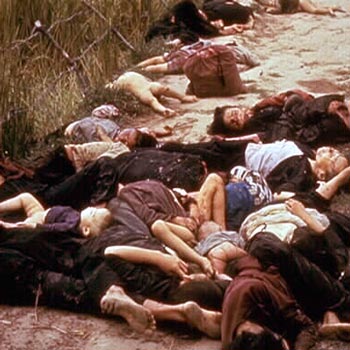 There were 649 reporters in Vietnam on March 16, 1968 - the day that the My-Lai massacre happened â and not one of them reported it. The very opposite was true. On my first day as a young reporter in Saigon, I called at the bureaus of the main newspapers and TV companies. I noticed that some of them had a pinboard on the wall on which were gruesome photographs, mostly of bodies of Vietnamese and of American soldiers holding up severed ears and testicles. In one office was a photograph of a man being tortured; above the torturers head was a stick-on comic balloon with the words, âthatâll teach you to talk to the press.â None of these pictures were ever published or even put on the wire. I asked why. I was told that the public would never accept them. Anyway, to publish them would not be objective or impartial. At first, I accepted the apparent logic of this. I too had grown up on stories of the good war against Germany and Japan, that ethical bath that cleansed the Anglo-American world of all evil. But the longer I stayed in Vietnam, the more I realized that our atrocities were not isolated, nor were they aberrations, but the war itself was an atrocity. That was the big story, and it was seldom news. Yes, the tactics and effectiveness of the military were questioned by some very fine reporters. But the word âinvasionâ was never used. The anodyne word used was âinvolved.â America was involved in Vietnam. The fiction of a well-intentioned, blundering giant, stuck in an Asian quagmire, was repeated incessantly. It was left to whistleblowers back home to tell the subversive truth, those like Daniel Ellsberg and Seymour Hersh, with his scoop of the My-Lai massacre. There were 649 reporters in Vietnam on March 16, 1968âthe day that the My-Lai massacre happenedâand not one of them reported it. 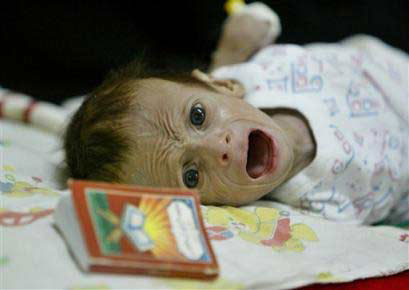 A three-month old baby in Iraq fighting for life - suffering from diahrea due to the toxic water. Last year a study published by the Johns Hopkins School of Public Health found that since the invasion of Iraq 655, 000 Iraqis had died as a direct result of the invasion. Official documents show that the Blair government knew this figure to be credible. In February, Les Roberts, the author of the report, said the figure was equal to the figure for deaths in the Fordham University study of the Rwandan genocide. The media response to Robertâs shocking revelation was silence. What may well be the greatest episode of organized killing for a generation, in Harold Pinterâs words, âDid not happen. It didnât matter.â In both Vietnam and Iraq, deliberate policies and strategies have bordered on genocide. In Vietnam, the forced dispossession of millions of people and the creation of free fire zones; In Iraq, an American-enforced embargo that ran through the 1990s like a medieval siege, and killed, according to the United Nations Childrenâs fund, half a million children under the age of five. In both Vietnam and Iraq, banned weapons were used against civilians as deliberate experiments. Agent Orange changed the genetic and environmental order in Vietnam. The military called this Operation Hades. When Congress found out, it was renamed the friendlier Operation Ranch Hand, and nothing change. Thatâs pretty much how Congress has reacted to the war in Iraq. The Democrats have damned it, rebranded it, and extended it. The Hollywood movies that followed the Vietnam War were an extension of the journalism, of normalizing the unthinkable. Yes, some of the movies were critical of the militaryâs tactics, but all of them were careful to concentrate on the angst of the invaders. The first of these movies is now considered a classic. Itâs The Deerhunter, whose message was that America had suffered, America was stricken, American boys had done their best against oriental barbarians. The message was all the more pernicious, because the Deerhunter was brilliantly made and acted. I have to admit itâs the only movie that has made me shout out loud in a Cinema in protest. Oliver Stoneâs acclaimed movie Platoon was said to be antiwar, and it did show glimpses of the Vietnamese as human beings, but it also promoted above all the American invader as victim.
A great many people today think that the problem is George W. Bush and his gang. And yes, the Bush gang are extreme. But my experience is that they are no more than an extreme version of what has gone on before. In my lifetime, more wars have been started by liberal Democrats than by Republicans. Ignoring this truth is a guarantee that the propaganda system and the war-making system will continue.
I wasnât going to mention The Green Berets when I set down to write this, until I read the other day that John Wayne was the most influential movie who ever lived. I a saw the Green Berets starring John Wayne on a Saturday night in 1968 in Montgomery Alabama. (I was down there to interview the then-infamous governor George Wallace). I had just come back from Vietnam, and I couldnât believe how absurd this movie was. So I laughed out loud, and I laughed and laughed. And it wasnât long before the atmosphere around me grew very cold. My companion, who had been a Freedom Rider in the South, said, âLetâs get the hell out of here and run like hell.â We were chased all the way back to our hotel, but I doubt if any of our pursuers were aware that John Wayne, their hero, had lied so he wouldnât have to fight in World War II. And yet the phony role model of Wayne sent thousands of Americans to their deaths in Vietnam, with the notable exceptions of George W. Bush and Dick Cheney. Last year, in his acceptance of the Nobel Prize for Literature, the playwright Harold Pinter made an epic speech. He asked why, and I quote him, âThe systematic brutality, the widespread atrocities, the ruthless suppression of independent thought in Stalinist Russia were well know in the West, while American state crimes were merely superficially recorded, let alone documented.â And yet across the world the extinction and suffering of countless human beings could be attributed to rampant American power. âBut,â said Pinter, âYou wouldnât know it. It never happened. Nothing ever happened. Even while it was happening it wasnât happening. It didnât matter. It was of no interest.â Pinterâs words were more than the surreal. The BBC ignored the speech of Britainâs most famous dramatist. 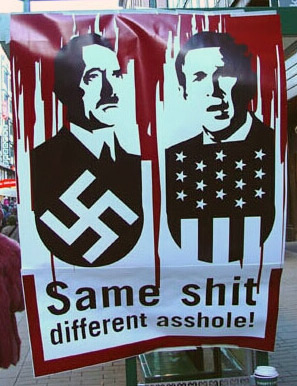 "The US is really beyond reason now. There is only one comparison: Nazi Germany. Nazi Germany wanted total domination of Europe and they nearly did it. The US wants total domination of the world and is about to consolidate that." - Harold Pinter, June 10, 2003
Harold Pinterâs subversive truth, I believe, was that he made the connection between imperialism and fascism, and described a battle for history thatâs almost never reported. This is the great silence of the media age. And this is the secret heart of propaganda today.
John Pilger Iâve made a number of documentaries about Cambodia. The first was Year Zero: the Silent Death of Cambodia. It describes the American bombing that provided the catalyst for the rise of Pol Pot. What Nixon and Kissinger had started, Pol Pot completedâCIA files alone leave no doubt of that. I offered Year Zero to PBS and took it to Washington. The PBS executives who saw it were shocked. They whispered among themselves. They asked me to wait outside. One of them finally emerged and said, âJohn, we admire your film. But we are disturbed that it says the United States prepared the way for Pol Pot.â I said, âDo you dispute the evidence?â I had quoted a number of CIA documents. âOh, no,â he replied. âBut weâve decided to call in a journalistic adjudicator.â Now the term âjournalist adjudicatorâ might have been invented by George Orwell. In fact they managed to find one of only three journalists who had been invited to Cambodia by Pol Pot. And of course he turned his thumbs down on the film, and I never heard from PBS again. Year Zero was broadcast in some 60 countries and became one of the most watched documentaries in the world. It was never shown in the United States. Of the five films I have made on Cambodia, one of them was shown by WNET, the PBS station in New York. I believe it was shown at about one in the morning. On the basis of this single showing, when most people are asleep, it was awarded an Emmy. What marvelous irony. It was worthy of a prize but not an audience. Harold Pinterâs subversive truth, I believe, was that he made the connection between imperialism and fascism, and described a battle for history thatâs almost never reported. This is the great silence of the media age. And this is the secret heart of propaganda today. A propaganda so vast in scope that Iâm always astonished that so many Americans know and understand as much as they do. We are talking about a system, of course, not personalities. And yet, a great many people today think that the problem is George W. Bush and his gang. And yes, the Bush gang are extreme. But my experience is that they are no more than an extreme version of what has gone on before. In my lifetime, more wars have been started by liberal Democrats than by Republicans. Ignoring this truth is a guarantee that the propaganda system and the war-making system will continue. Weâve had a branch of the Democratic party running Britain for the last 10 years. Blair, apparently a liberal, has taken Britain to war more times than any prime minister in the modern era. Yes, his current pal is George Bush, but his first love was Bill Clinton, the most violent president of the late 20th century. Blairâs successor, Gordon Brown is also a devotee of Clinton and Bush. The other day, Brown said, âThe days of Britain having to apologize for the British Empire are over. We should celebrate.â
For most journalists, whether they realize it or not, are groomed to be tribunes of an ideology that regards itself as non-ideological, that presents itself as the natural center, the very fulcrum of modern life. This may very well be the most powerful and dangerous ideology we have ever known because it is open-ended. This is liberalism. Iâm not denying the virtues of liberalism â far from it. We are all beneficiaries of them. But if we deny its dangers, its open-ended project, and the all-consuming power of its propaganda, then we deny our right to true democracy, because liberalism and true democracy are not the same. Liberalism began as a preserve of the elite in the 19th century, and true democracy is never handed down by elites. It is always fought for and struggled for.
Like Blair, like Clinton, like Bush, Brown believes in the liberal truth that the battle for history has been won; that the millions who died in British-imposed famines in British imperial India will be forgottenâlike the millions who have died in the American Empire will be forgotten. And like Blair, his successor is confident that professional journalism is on his side. For most journalists, whether they realize it or not, are groomed to be tribunes of an ideology that regards itself as non-ideological, that presents itself as the natural center, the very fulcrum of modern life. This may very well be the most powerful and dangerous ideology we have ever known because it is open-ended. This is liberalism. Iâm not denying the virtues of liberalismâfar from it. We are all beneficiaries of them. But if we deny its dangers, its open-ended project, and the all-consuming power of its propaganda, then we deny our right to true democracy, because liberalism and true democracy are not the same. Liberalism began as a preserve of the elite in the 19th century, and true democracy is never handed down by elites. It is always fought for and struggled for. A senior member of the antiwar coalition, United For Peace and Justice, said recently, and I quote her, âThe Democrats are using the politics of reality.â Her liberal historical reference point was Vietnam. She said that President Johnson began withdrawing troops from Vietnam after a Democratic Congress began to vote against the war. Thatâs not what happened. The troops were withdrawn from Vietnam after four long years. And during that time the United States killed more people in Vietnam, Cambodia and Laos with bombs than were killed in all the preceding years. And thatâs whatâs happening in Iraq. The bombing has doubled since last year, and this is not being reported. And who began this bombing? Bill Clinton began it. During the 1990s Clinton rained bombs on Iraq in what were euphemistically called the âno fly zones.â At the same time he imposed a medieval siege called economic sanctions, killing as Iâve mentioned, perhaps a million people, including a documented 500,000 children. Almost none of this carnage was reported in the so-called mainstream media. Last year a study published by the Johns Hopkins School of Public Health found that since the invasion of Iraq 655, 000 Iraqis had died as a direct result of the invasion. Official documents show that the Blair government knew this figure to be credible. In February, Les Roberts, the author of the report, said the figure was equal to the figure for deaths in the Fordham University study of the Rwandan genocide. The media response to Robertâs shocking revelation was silence. What may well be the greatest episode of organized killing for a generation, in Harold Pinterâs words, âDid not happen. It didnât matter.â Many people who regard themselves on the left supported Bushâs attack on Afghanistan. That the CIA had supported Osama Bin Laden was ignored, that the Clinton administration had secretly backed the Taliban, even giving them high-level briefings at the CIA, is virtually unknown in the United States. The Taliban were secret partners with the oil giant Unocal in building an oil pipeline across Afghanistan. And when a Clinton official was reminded that the Taliban persecuted women, he said, âWe can live with that.â There is compelling evidence that Bush decided to attack the Taliban not as a result of 9-11, but two months earlier, in July of 2001. This is virtually unknown in the United Statesâpublicly. Like the scale of civilian casualties in Afghanistan. To my knowledge only one mainstream reporter, Jonathan Steele of the Guardian in London, has investigated civilian casualties in Afghanistan, and his estimate is 20,000 dead civilians, and that was three years ago.
There is a pioneering study by Glasgow University on the reporting of Palestine. They interviewed young people who watch TV news in Britain. More than 90 percent thought the illegal settlers were Palestinian. The more they watched, the less they knewâDanny Schecterâs famous phrase.
The enduring tragedy of Palestine is due in great part to the silence and compliance of the so-called liberal left. Hamas is described repeatedly as sworn to the destruction of Israel. The New York Times, the Associated Press, the Boston Globeâtake your pick. They all use this line as a standard disclaimer, and it is false. That Hamas has called for a ten-year ceasefire is almost never reported. Even more important, that Hamas has undergone an historic ideological shift in the last few years, which amounts to a recognition of what it calls the reality of Israel, is virtually unknown; and that Israel is sworn to the destruction of Palestine is unspeakable. There is a pioneering study by Glasgow University on the reporting of Palestine. They interviewed young people who watch TV news in Britain. More than 90 percent thought the illegal settlers were Palestinian. The more they watched, the less they knewâDanny Schecterâs famous phrase. The current most dangerous silence is over nuclear weapons and the return of the Cold War. The Russians understand clearly that the so-called American defense shield in Eastern Europe is designed to subjugate and humiliate them. Yet the front pages here talk about Putin starting a new Cold War, and there is silence about the development of an entirely new American nuclear system called Reliable Weapons Replacement (RRW), which is designed to blur the distinction between conventional war and nuclear warâa long-held ambition.
What so few people know is that in the last half century, United States administrations have overthrown 50 governments â many of them democracies. In the process, thirty countries have been attacked and bombed, with the loss of countless lives. Bush bashing is all very wellâand is justifiedâbut the moment we begin to accept the siren call of the Democratâs drivel about standing up and fighting for freedom sought by billions, the battle for history is lost, and we ourselves are silenced.
In the meantime, Iran is being softened up, with the liberal media playing almost the same role it played before the Iraq invasion. And as for the Democrats, look at how Barak Obama has become the voice of the Council on Foreign Relations, one of the propaganda organs of the old liberal Washington establishment. Obama writes that while he wants the troops home, âWe must not rule out military force against long-standing adversaries such as Iran and Syria.â Listen to this from the liberal Obama: âAt moment of great peril in the past century our leaders ensured that America, by deed and by example, led and lifted the world, that we stood and fought for the freedom sought by billions of people beyond their borders.â That is the nub of the propaganda, the brainwashing if you like, that seeps into the lives of every American, and many of us who are not Americans. From right to left, secular to God-fearing, what so few people know is that in the last half century, United States adminstrations have overthrown 50 governmentsâmany of them democracies. In the process, thirty countries have been attacked and bombed, with the loss of countless lives. Bush bashing is all very wellâand is justifiedâbut the moment we begin to accept the siren call of the Democratâs drivel about standing up and fighting for freedom sought by billions, the battle for history is lost, and we ourselves are silenced. So what should we do? That question often asked in meetings I have addressed, even meetings as informed as those in this conference, is itself interesting. Itâs my experience that people in the so-called third world rarely ask the question, because they know what to do. And some have paid with their freedom and their lives, but they knew what to do. Itâs a question that many on the democratic leftâsmall âdââhave yet to answer.
In every university, in every media college, in every news room, teachers of journalism, journalists themselves need to ask themselves about the part they now play in the bloodshed in the name of a bogus objectivity. Such a movement within the media could herald a perestroika of a kind that we have never known. This is all possible. Silences can be broken. In Britain the National Union of Journalists has undergone a radical change, and has called for a boycott of Israel.
Real information, subversive information, remains the most potent power of allâand I believe that we must not fall into the trap of believing that the media speaks for the public. That wasnât true in Stalinist Czechoslovakia and it isnât true of the United States. In all the years Iâve been a journalist, Iâve never know public consciousness to have risen as fast as itâs rising today. Yes, its direction and shape is unclear, partly because people are now deeply suspicious of political alternatives, and because the Democratic Party has succeeded in seducing and dividing the electoral left. And yet this growing critical public awareness is all the more remarkable when you consider the sheer scale of indoctrination, the mythology of a superior way of life, and the current manufactured state of fear. Why did the New York Times come clean in that editorial last year? Not because it opposes Bushâs warsâlook at the coverage of Iran. That editorial was a rare acknowledgement that the public was beginning to see the concealed role of the media, and that people were beginning to read between the lines. If Iran is attacked, the reaction and the upheaval cannot be predicted. The national security and homeland security presidential directive gives Bush power over all facets of government in an emergency. It is not unlikely the constitution will be suspendedâthe laws to round of hundreds of thousands of so-called terrorists and enemy combatants are already on the books. I believe that these dangers are understood by the public, who have come along way since 9-11, and a long way since the propaganda that linked Saddam Hussein to al-Qaeda. Thatâs why they voted for the Democrats last November, only to be betrayed. But they need truth, and journalists ought to be agents of truth, not the courtiers of power. I believe a fifth estate is possible, the product of a peopleâs movement, that monitors, deconstructs, and counters the corporate media. In every university, in every media college, in every news room, teachers of journalism, journalists themselves need to ask themselves about the part they now play in the bloodshed in the name of a bogus objectivity. Such a movement within the media could herald a perestroika of a kind that we have never known. This is all possible. Silences can be broken. In Britain the National Union of Journalists has undergone a radical change, and has called for a boycott of Israel. The web site Medialens.org has single-handedly called the BBC to account. In the United States wonderfully free rebellious spirits populate the webâI canât mention them all hereâfrom Tom Feeleyâs International Clearing House, to Mike Albertâs ZNet, to Counterpunch online, and the splendid work of FAIR. The best reporting of Iraq appears on the webâDahr Jamailâs courageous journalism; and citizen reporters like Joe Wilding, who reported the siege of Fallujah from inside the city.
Journalists ought to be agents of truth, not the courtiers of power.
John Pilger In Venezuela, Greg Wilpertâs investigations turned back much of the virulent propaganda now aimed at Hugo Chávez. Make no mistake, itâs the threat of freedom of speech for the majority in Venezuela that lies behind the campaign in the west on behalf of the corrupt RCTV. The challenge for the rest of us is to lift this subjugated knowledge from out of the underground and take it to ordinary people. We need to make haste. Liberal Democracy is moving toward a form of corporate dictatorship. This is an historic shift, and the media must not be allowed to be its façade, but itself made into a popular, burning issue, and subjected to direct action. That great whistleblower Tom Paine warned that if the majority of the people were denied the truth and the ideas of truth, it was time to storm what he called the Bastille of words. That time is now. Speech delivered at the Chicago Socialism 2007 Conference on Saturday June 16 2007
John Pilger: exposing the rotten heart of the empireCharlie Kimber, Socialist Worker Journalist and film-maker John Pilger spoke to Charlie Kimber about his new book and the global resistance to imperialism, war and neoliberalism. In his latest book, the marvellous Freedom Next Time, journalist and film-maker John Pilger presents âan antidote to authorised versions of contemporary history that censor by omission and impose double standardsâ. 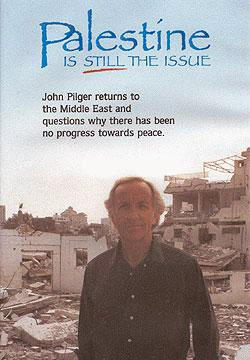 Palestine is Still the Issue (2002), Written and Presented by John Pilger (53mins)
I knew that the hardest work would be dealing with the Zionist response. The film [Palestine Is Still The Issue] was followed by a blizzard of complaints, most of them orchestrated by an organisation in New York called âHonest Reportingâ.
John Pilger The first chapter exposes the British governmentâs actions in the 1960s and 1970s when it expelled the population of the Chagos Islands in the Indian Ocean and handed over the island of Diego Garcia to the US. The people, who are British citizens, were dumped in the Seychelles and Mauritius where they still live in poverty. Suffering the fate of so many victims of imperialism, Diego Garciaâs 2,000 inhabitants became an âunpeopleâ. âThe expulsion of the people of the Chagos Islands by British governments is a vivid example of the way empire diminishes human beings,â said John. âWhat struck me in the official files of the cover-up - mostly foreign office documents - was the contempt with which officials held the islanders. They referred to them as âTarzansâ or as if they didnât exist. âOne document, headed âMaintaining the fictionâ, is a guide to how British officials should lie publicly about the enforced depopulation of people who had lived in the Chagos since the late 18th century. âThe official in charge of the expulsion demanded that the islandersâ dogs be exterminated but that horses, which belonged to the plantation company, should travel on deck. Women and children were confined below on a cargo of bird fertiliser. âThe same number of British citizens lived in the Falklands, and in 1982 Margaret Thatcher sent the Royal Navy to rescue them from the Argentines. The difference was that they were white. âOf course there have been many changes, but attitudes essentially havenât changed. In the US empire, people other than the favoured elite - are considerely barely human. âAmericans killed Vietnamese as if they were vermin - we remember the My Lai massacre, but in the same province, Quang Ngai, I found that as many as 50,000 Vietnamese had been slaughtered. âThe Vietnamese were merely âgooksâ and âdinksâ. The same lethal racism is alive and well in Iraq. We now have the most rigorously tested estimate of Iraqi deaths and itâs 655,000. SlaughterâNot all these can be attributed to the Americans and British, but the violence they ignited is wholly responsible. A US colonel in the first Gulf slaughter said, âWe count every screwdriver, but we donât count dead civiliansâ.â I asked John about the difference between the way Western leaders are treated in the media and those who resist them. âYou only need watch or listen to the broadcast news from Afghanistan (and Iraq) to get a sense that âweâ are either eternal victims or forever doing our best in noble, trying circumstances,â said John. âThe opposite is invariably true, in my experience. The news will say that â40 Talibanâ or â200 insurgentsâ have been killed. There will be no explanation of who these people really were. âItâs OK to kill Taliban in their own country, just as it was OK to kill communists whomever they were. The vermin factor again. Now and then, the âinsurgentsâ turn out to be families of 20 or 30, many of them children. âThat will be acknowledged in the Independent and the Guardian, but not for long. Afghanistan is considered the âright warâ to be fighting - thatâs the propaganda. Itâs a fraud, like the Iraq âwarâ. âThe mujahideen, who comprise the âbadâ Taliban and the âgoodâ CIA-bankrolled warlords, were turned into jihadists by the US and Britainâs obsession with destroying the Soviet Union. âIt was the âprincipledâ US President Carter who began secretly arming and training them. It was the âliberalâ President Clinton who secretly encouraged the Taliban in power. âThe notion that British squaddies are defending democracy in Afghanistan is absurd. âPresidentâ Karzai dare not leave his bunker without a squad of US Special Forces guards. âThe Talibanâs achievement in power was to ban the opium business. Flushed with CIA money, âourâ warlords restored it following the Talibanâs demise. John Reid neglected to mention this when he sent the British army off to put down the âdrug baronsâ.â Those who expose the realities of imperialism can expect a fierce response, as John found when he made the documentary Palestine Is Still The Issue. John said, âI knew that the hardest work would be dealing with the Zionist response. The film was followed by a blizzard of complaints, most of them orchestrated by an organisation in New York called âHonest Reportingâ. âThe way it works is that these American Zionists write a generic complaining e-mail and people all over the world send it to ITV having not seen the film. âIn Britain, I received death threats delivered with posh north London accents. The Independent Television Commission (ITC) decided to investigate and subjected the film to an exhaustive enquiry, which required my producer Chris Martin and me to write the equivalent of a doctoral thesis defending the film. âEvery statement, every frame of film had to be substantiated. IntegrityâThe Zionist campaign failed. The ITC praised my filmâs âjournalistic integrityâ and the âcomprehensiveness and authorityâ of its historical and other factual sources. I suppose that proved an old maxim: always stand up to bullies.â Isnât there a danger, I ask, that the bookâs chapter on the South African experience of continuing and even worsening poverty after the end of apartheid could make people wonder if the struggle was worthwhile. âThe South Africa chapter describes no more that that which most South Africans themselves believe,â said John. âThe Mbeki government swallowed neoliberalism whole. âThey betrayed the Freedom Charter and the memories of those who fought apartheid. The result is increasing poverty - and a rich, often corrupt black elite has made its peace with white capital. âOf course, the struggle was worth it! âToday, there is a vibrant resistance in South Africa, and my guess is that important changes in the ANC alliance are coming. After all, it was Nelson Mandela who warned, âIf the ANC does not deliver the goods, the people must do to it what they have done to the apartheid regimeâ.â This book is a powerful weapon for all who fight empire. Source: http://www.socialistworker.co.uk/article.php?article_id=9989 Voice of the unpeople |
|
Support Us
If you agree with our work then please support us.Campaigns INMINDS Facebook Live Feed Latest Video's
INMINDS Twitter Feed Tweets by @InmindsComFeatured Video's
You need Flash player 8+ and JavaScript enabled to view this video.
[all videos (over 200)..] Featured MP3 Podcast  "Scalp bounties were the payment of a fee for proof of death of an Indian, any Indian, on a graduated scale. At the top of the scale they would pay the highest amount for proof of death by way of the production of a scalp, or bloody red skin - origin of the term 'red skins' - of an adult male Indian. Half that fee would be payed for proof of death by the same means of a adult female, quarter to be payed for proof of death of a child, child being defined as as a human being under 10 years of age down to and including a fetus.. every single colony on the east coast, every state of the Union and territory of the United States within the confines of the 48 contiguous states, had in place, in some period of its history, a scalp bounty - removed usually when there were no longer sufficient number of Indians left to kill to warrant its continuation..that's as absolutely clinical a genocidal policy as is possible to envision, they weren't interested in any particular Indians, any Indians would do and they would pay for proof of death - they wanted all of us dead." American Indian scholar, activist in the struggle for liberation of Indigenous Peoples in America Genocide of Indigenous Peoples in North America, Action for Social and Ecological Justice on December 2, 2001, in Burlingotn, VT [50min / 11Mb] [all podcasts..] Newsletter Feedback |
 |
 |
